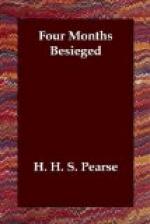December 16.—Except for a bombardment heavier than ordinary, the past three days have been uneventful. Sounds of battle reached us in a dull roar from the distant southward. They grew more continuous yesterday, but rolled no nearer, and therefore told us nothing except that Sir Redvers Buller was making a vigorous effort to join hands with beleaguered Ladysmith, and that the Boers were with equal stubbornness trying to beat him back along the banks of the Tugela. From far-off Umkolumbu Mountain heliograph signals were flashed to us occasionally, but in cipher, the meaning of which is known only at headquarters. At dawn this morning the Boers celebrated Dingaan’s Day by a royal salute from the big Creusot on Bulwaan and fourteen other guns. All fired shells, which fell thick about the camps, killing one Artilleryman, one Gordon Highlander, and a civilian; several other men were slightly wounded by splinters, but none seriously.
December 17.—Depressing news is now made public from Sir Redvers Buller, who made his effort on Friday for the relief of Ladysmith and failed. He bids us wait in patience for another month until siege artillery can reach him. The special correspondents were summoned in haste this morning to hear an abridged version of the heliograph message read. They were asked to break this news gently to the town before unauthorised editions could get abroad, but somehow the ill tidings had travelled fast and with more fulness of detail than the Intelligence Department thought fit to divulge. There has been gloom over Ladysmith to-day, which blazing sunshine cannot dispel, and Colonials in their anger use strong language, for which a temperature of 107 deg. in the shade may be in some measure accountable.
Mr. Pearse’s notes for the next few days are mainly devoted to the bombardment, which now became hotter and more persistent than ever, their success at the Tugela having inspired the enemy with new hopes of reducing the town. On Monday the 18th
the shelling began at daybreak, and lasted with little intermission until nearly dark from Boer guns all round our positions. Bulwaan began by throwing a shrapnel, which burst low over the camp of Natal Carabineers when the men were at morning stables. Four of them were killed, seven wounded, and a private of the Royal Engineers so badly hit that he lingered only a few hours. The same shell killed eleven horses in the Carabineer lines. In the town many people had narrow escapes when Bulwaan’s 6-inch Creusot swept round, bringing its fire to bear with destructive effect on several prominent houses. One man lying in bed had a shell pass over him from head to foot within a few inches of his body. It burst on striking the floor, and well-nigh stifled him with dust and sulphurous fumes. When Bulwaan ceased Telegraph Hill began throwing shells even to the Manchester sangars on Caesar’s Camp, wounding three or four men, and one private of that regiment was killed by a Pom-Pom shot from the ridge beyond Bester’s Farm.




